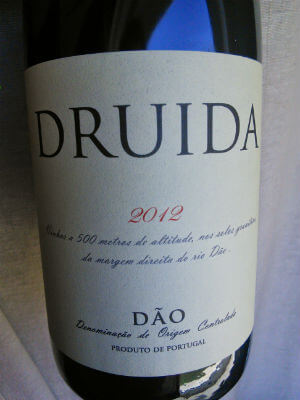Text João Pedro Carvalho | Translation Jani Dunne
In all my life, I have never been fond of mass-produced products – nor have they ever pleased me – except for one or another rare items; as for everything else, I have always sought after small producers in every industry. For years, I have practiced XC (Cross Country) and, thus, belonged to a world where highly profitable materials and products with a long life-cycle are in high demand, all the while remaining lightweight and low-priced. The latter option is a rare find. Carrying this over to the wine world, what I shop around for still falls within the same guidelines of quality in production vs. customer satisfaction, where prices of small-production products turn out expensive. However, in most cases there is good return in the long-term.

Druida red 2012 – Photo by João Pedro Carvalho | All Rights Reserved
Boutique cellars, or shall I say proprietary cellars have been popping up in Portugal recently and have notably been delighting a niche of enthusiasts who are eager to find small-production wines with strong character. The unique feeling of a high quality wine in your hands, of which only 96 or 200 bottles were produced will make you feel special. Of course, in almost all of these projects, the spotlight naturally falls on the land. In fact, mostly on the vineyard, which often takes up only a small space. These wines clearly transpire the earth and the place that brought them up.
This is also the case for Druida red 2012, the most recent creation by the duo Nuno do Ó and João Correia, following the very successful Druida Reserva white. Sometimes things happen for a reason and that is the case of this red wine. One day, the Encruzado must was being transferred into casks and two casks were leftover. The first solution that sprung to mind was to make red wine. They used the field blend from the plot of land right next door where Encruzado is grown, in Quinta da Turquide, another plot whose field blend consists of Jaén, Touriga Nacional as well as some Alfroucheiro and Tinta Pinheira. The end result was two kegs containing 228 litres that rested in the cellar for 20 months, resulting in about 500 bottles of a refreshing red with a good grasp.
Just as with white wine, time, we have come to realise, is essential for the maturing process and for a more pleasure tasting than ever before, in spite of the stern hold in the wine. A fresh bouquet, a complex bundle of flavours – still quite compact, yet with excellent quality –, deep and with beautiful notes of pine, violets, spices, clean fruits of high quality, and lastly, a nod to the juicy and voluptuous red cherry. In a triad of elegance, freshness and structure, a beautiful example of Dão is revealed. Its minimalistic creation of inexpensive production, a guaranteed pleasure alongside wood-fire oven-roasted lamb, today or in ten years’ time.




Leave a Reply